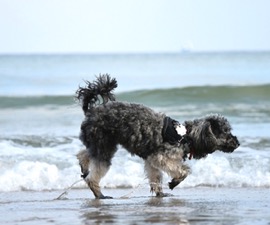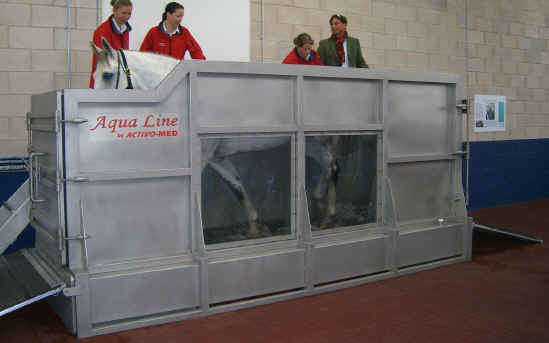Learn How Hydrotherapy Can Benefit Your Animal

What is Hydrotherapy and How Can It Help My Horse or Dog?
Hydrotherapy can take several forms for your animal, eg -
- Cold Water Hosing
- Hot Water Hosing
- Swimming
- Equine Spa
- Equine Aqua Treadmill
- Cold water hosing is useful in treating new injuries. Such as a kick, bruise or bump or where you can feel heat at the point of injury. The cold water helps to reduce inflammation and thus reduces the level of pain that your horse (or dog) may experience.
- Ice may be used also (there are numerous icepacks available for animals) - however, these should be used with care as if applied for too long ice can damage the tissues, (use approximately for 15 minutes at 2 hourly intervals).
Cold Water Therapy
If your horse or dog has an open wound, only apply cold therapy until the swelling subsides or the formation of tissue to close the wound may be retarded. For best results cold water therapy is beneficial on new injuries.
You could use cold water by hosing or using a bucket (to put a leg/foot into the water). Also cryotherapy is becoming increasingly common to help horses. Learn more about this in my Cryotherapy advice page here
Here's some research from the Journal of Equine Veterinary Science showing benefits of cold water therapy to help equine health, click here.
Hot Water
helps to increase the blood flow to the site of injury. However, you should not apply heat to an injury which is still warm to the touch. This means that inflammation is present and applying more heat could worsen the inflammation and cause more pain to the animal. Of course always make sure the hot water is not too hot! Warmth can be beneficial to your horse or dog's arthritis.Swimming
is increasing in popularity for both the treatment and fittening of horses and dogs. Animal swimming pools are generally either circular or long and straight in appearance with the handler either standing in the middle (of a circular pool) or walking alongside a long pool to ensure that the animal is completely safe at all times.Why should your horse or dog swim?
Swimming helps to challenge the musculoskeletal system without concussing the injury. This is ideal for both dogs and horses. If your dog or horse has arthritis, hydrotherapy can form part of his or her exercise regime. It can be used to help keep them mobile and healthy. Importantly helping them just to enjoy life!
Remember though that horses are not naturally strong swimmers. So it's important not to overdo any swimming therapy. One reason being that swimming does exert pressure on the chest which is unnatural for horses.
Equine swimming is popular with the rehabilitation and fitness of racehorses. This is because swimming is a strenuous exercise and is great resistance training for a sound horse. Swimming should be considered as one element of a fitness programme only. As concussion on limbs is a natural part of the healing process and should not be avoided completely.
An equine performance specialist trainer can help advise on what fitness programme suits your horse.
What about the sea or rivers?
Yes many dogs and horses will happily swim in a sea or river. But always make sure it's safe. This may seem obvious, but rivers and the sea can have rough ground, that changes every day as the tide and water move over. So rocks and holes may appear, that weren't there before. Always check the seabed or riverbed is safe each time before your horse or dog go in. Plus don't do too much! It's easy to enjoy yourself (and see your horse or dog happy) you spend too long, so hours later your animal is unhappy and over-exerted.
Canine Hydrotherapy
Choose a professionally run centre. They often supply buoyancy aids for your dog, so that s/he can enjoy their swim safely! And have qualified canine hydrotherapists looking after your dog. The swimming pool will usually be specially designed and with water at a temperature that is comfortable for your dog.If you're worried whether your dog will be able to get in/out of the pool easily - many pools have specially adapted hoists. This enables your dog to get safely in/out of the pool. Very important for dogs who may have mobility problems. When looking for a hydrotherapy pool for your dog, look for a centre that has professionally trained staff (e.g. Hawksmoor) or is a member of a professional association (e.g. Canine Hydrotherapy Association). See below for more help on choosing a centre for your animal.
Equine Spas
use the beneficial effects of sea water to promote healing of leg injuries (e.g. ligament/tendon/joint problems, etc) in horses. Cold salinated water combined with the spa's bubbles are used in a specially designed spa. The horse simply stands inside the spa unit (which isn't unlike a small trailer - without the roof!) and the water is then added. The bubbles have a massaging effect and the salinated water can have a 'poulticing' effect drawing out any fluid. Due to the low temperature used in an equine spa, it is essential that the major muscle groups are not submerged, otherwise the horse may suffer from hypothermia - therefore equine spa is only suitable for treating leg conditions (below the hock). Unlike swimming or aqua treadmills, equine spa are not used for exercise.Equine Aqua Treadmills
- Temperature controlled water is used that is also deep enough for the horse to be partially supported through floatation, whilst still allowing the horse contact with the treadmill. Aqua treadmills provide the horse with a natural form of exercise, which can be helpful in the recovery from injury. However, Aqua treadmills should not be used in the acute stage of an injury (this is a significant difference with the equine spa). One of the benefits of Aqua treadmills is that they allow the horse to use similar muscles to what it would use in 'ground training' - this contrasts with traditional swimming, where different muscle groups are used.
Photograph courtesy of Moulton College Equine Therapy Centre.
Many equine hydrotherapy centres also offer livery or training facilities, so using hydrotherapy facilities can be part of a rehabilitation or training programme.
Hydrotherapy has many uses and benefits. But as with all complementary therapies you should consult your veterinary surgeon first. So that hydrotherapy is used as part of a complete rehabilitation programme for your horse or dog.
How To Choose a Hydrotherapy Centre For Your Animal
It is always a good idea to visit a hydrotherapy centre first, before your animal commences a treatment programme. By visiting first you can check the facilities, ask about the staff's qualification and training, their insurance cover, plus what the water quality is. Also, it's important to discuss your horse or dog's condition and treatment programme.
Some hydrotherapy centres are accredited by associations such as the Canine Hydrotherapy Association or the Association of Canine Water Therapy, which is worth checking too.
And in 2020, the Equine Hydrotherapy Working Group, put together by members of Moulton’s Equine Therapy Centre published an official document on the safe use of Aqua Treadmills for horses.
‘Equine Water Treadmills – a guide for users’ offers recommendations and support on the correct use and operation of equine water treadmills.'
Find out if your horse hydrotherapy treadmill centre is using this guidance.
Own a stables/livery yard/equestrian centre & like an Equine Aqua Treadmill or Equine Spa?
Over recent years, due to the benefits of hydrotherapy becoming more widely known, many stables - private and professional, have obtained their own spa's and aqua treadmills.
For more info on Equine Aqua Treadmills, visit the FMBS website here and for information on Equine Spa's visit the CET website
Or Would You Like To Train in Hydrotherapy for Animals?
Visit my training advice page here for tips and information on training centres!
Is there any research into the effectiveness of hydrotherapy for animals?
Yes here's some research into the benefits of hydrotherapy for horses:
- How swimming affects plasma insulin and glucose concentration in Thoroughbreds: A pilot study. (University of Pisa, 2017)
- Osteoarthritis - Review of the role of aquatic therapy in managing equine osteoarthritis (Colorado State University, 2016)
- Vertical Displacement of the Equine Pelvis When Trotting on an Aqua Treadmill (Equine Veterinary Journal, 2014)
- Workload of horses on a water treadmill: effect of speed and water height on oxygen consumption and cardiorespiratory parameters (BMC Veterinary Research. 2017;13:360. doi:10.1186/s12917-017-1290-2)
- Response of twenty-seven horses with lower leg injuries to cold spa bath hydrotherapy (Journal of Equine Veterinary Science, 2001; https://doi.org/10.1016/S0737-0806(01)70121-9)
- The use of treadmills within the rehabilitation of horses (Journal of Equine Veterinary Science, 2017)
- Conditioning equine athletes on water treadmills significantly improves peak oxygen consumption (BMJ Veterinary Record, 2020)
Visit my research page for information on evidence on other animals and more benefits of natural animal therapies.
UK Canine Hydrotherapists
Devon
Would you like help finding a qualified Hydrotherapy services near you for your horse or dog? Please email us at info@taranet.co.uk - we'll be pleased to try and assist!
You can get more information on many complementary therapies for animals here at Taranet. Take a look at the sitemap here for a list.
